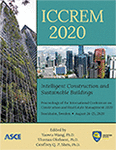International Conference on Construction and Real Estate Management 2020
Effects of City Scale’s Expansion on Urban Residents’ Income Growth: Based on the Empirical Evidence of CHIP 2009
Publication: ICCREM 2020: Intelligent Construction and Sustainable Buildings
ABSTRACT
Based on the usage of instrumental variable estimate and the research sample-Chinese Household Income Project Survey (hereafter referred to as CHIP) 2009, this paper does a research on efficiency of urban residents’ income growth as well as their well-being caused by city scale’s expansion. The results show that, for one thing, city scale plays a driving role in this income growth which demonstrates as an inverted U-shape, for another, the city scale that maximizes the growth falls in the range of 2.8678 million to 2.8945 million in control of individual eigenvector and urban eigenvector. Consequently, the strategy to develop large cities is effective on improving urban residents’ income and well-being.
Get full access to this article
View all available purchase options and get full access to this chapter.
REFERENCES
Au, C. and Henderson, V. (2006). “Are Chinese Cities too Small.” Review of Economic Studies, 73(2), 549-576.
Gao, H.Y. and Wu, K.P. (2007). “Agglomeration Effect, Agglomeration Efficiency and Urban Size Distribution Change.” Statistical Research, 24(03), 44-47. (in Chinese).
Huang, Y.H. (2006). “Econometric Analysis on the Relationship between Urbanization Level and Economic Development.” Research on Financial and Economic Issues, 12(03), 87-91. (in Chinese).
Jin, X.Y. (2004). “Theory and Empirical Analysis of Optimal City Scale: A Case Study of Three Municipalities in China.” Shanghai Journal of Economics, 10(07), 35-43. (in Chinese).
Liu, J. and Song, W.W. (2013). “How Does the Institutional Gap Affect FDI and FPI Flows.” Review of Economy and Management, 9(01), 18-23. (in Chinese).
Lu, M., Gao, H. and Zuo, T.H. (2012). “City Scale and Inclusive Employment.” Social Science Research,33(10), 47-66+206. (in Chinese).
Ma, S.C. and Song, L.M. (2003). “Analysis and Comparative Study on the Development Level of Urban Scale in China.” Statistical Research, 07(27), 30-34. (in Chinese).
Qi, C.Q. and He, F. (2004). “The Development of Urbanization in Asian Countries and Its Challenges.” World Economics and Politics, 12(11), 48-53+6. (in Chinese).
Tao, R. (2005). “On Urban Scale, Centralized Investment and Regional Economic Growth.” SpecialZone Economy, 24(11), 88-89. (in Chinese).
Wang, J.Y. (2003). “Comparative Analysis of Population Urbanization and Economic Growth in Economic Development.” China’s Population, Resources and Environment, 13(05),52-58. (in Chinese).
Wang, X.L. and Xia, X.L. (1999). “Optimizing City Scale and Promoting Economic Growth.” Economic Research, 40(09), 22-29. (in Chinese).
Wang, Y.Q. (2012). “The Scale Efficiency Curve of Inverted ‘U’ Cities and Policy Implications-A Comparative Study on Economic, Social and Environmental Efficiency of Cities above Prefecture Level in China.” Finance Trade Economics, 37(11), 127-136. (in Chinese).
Xie, X.P. and Wang X.B. (2012). “Evolution of City Scale Distribution and Economic Growth.” South China Journal of Economics, 21(06), 58-73. (in Chinese).
Xu, Q. and Chen, X. (2013). “The Optimal Scale of Labor Transfer and Urban Labor Agglomeration: Based on the Panel Data of Prefecture-Level Cities.” Modern Economic Science, 35(05), 65-73+126. (in Chinese).
Zhang, Y.W. (2009). “An Empirical Study on the Optimal Urban Scale in China from the Perspective of Economic Growth.” Shanghai Journal of Economics, 41(05), 31-38. (in Chinese).
Zhou, Y.X. (1995). Urban Geography, Commercial Press, Beijing.
Information & Authors
Information
Published In
ICCREM 2020: Intelligent Construction and Sustainable Buildings
Pages: 353 - 359
Editors: Yaowu Wang, Ph.D., Harbin Institute of Technology, Thomas Olofsson, Ph.D., Luleå University of Technology, and Geoffrey Q. P. Shen, Ph.D., Hong Kong Polytechnic University
ISBN (Online): 978-0-7844-8323-7
Copyright
© 2020 American Society of Civil Engineers.
History
Published online: Oct 14, 2020
Published in print: Oct 14, 2020
Authors
Metrics & Citations
Metrics
Citations
Download citation
If you have the appropriate software installed, you can download article citation data to the citation manager of your choice. Simply select your manager software from the list below and click Download.
